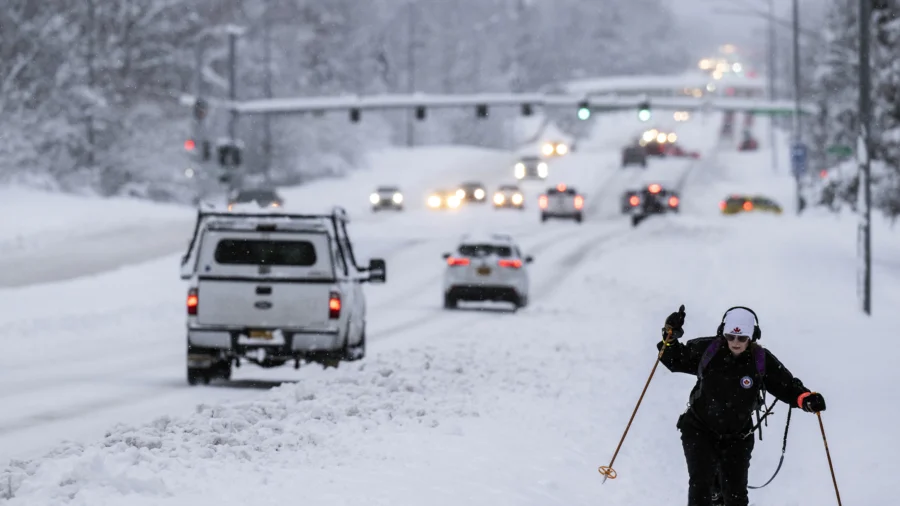Large areas of the United States could face “insufficient electricity supplies” in the winter due to cold temperatures and potential disruption in natural gas supplies, according to a recent report by power grid watchdog North American Electric Reliability Corp (NERC).
“A large portion of the North American BPS (bulk power system) is at risk of insufficient electricity supplies during peak winter conditions,” said NERC’s 2023–2024 Winter Reliability Assessment report published Wednesday. It estimated that during the upcoming December-February winter period, much of the eastern United States would either be at an “elevated” or “high” risk of constrained electricity supplies.
Two key factors the report cited as contributing to electricity supply constraints are “prolonged, wide-area cold snaps” and the “availability of fuel supplies for natural-gas-fired generation.”
- Cold Temperatures: During the recent winter, more than 20 percent of generating capacity was forced offline due to freezing temperatures. Since electric heating systems tend to consume more power during cold temperatures, the higher consumer demand will complicate issues if electricity supplies are low. Such areas “are at greatest risk for electricity supply shortfalls this winter.”
- Natural Gas Supplies: When the supply of natural gas is insufficient, output from gas-fired power generators “can be threatened.” The report pointed out that there is an “interconnected energy delivery system” ensuring the production, storage, and transportation of natural gas to BPS. Cold weather can disrupt this system by negatively affecting the production of natural gas. “During Winter Storm Elliott (December 2022), natural gas production rapidly declined with the onset of extreme cold temperatures, contributing to wide-area electricity and natural gas shortages.”
NERC’s warning ahead of the winter season comes amid the Biden administration’s push toward curtailing fossil fuel power generation while promoting renewable power. Experts fear that such a transition could make the country’s power grid unreliable.
An April report from the U.S. Energy Information Agency (EIA) revealed that the least amount of natural gas pipeline was built in 2022 under the Biden administration since such records began to be kept in 1995.
During a May 4 hearing of the Senate Energy & Natural Resources Committee, Federal Energy Regulatory Commission (FERC) Commissioner Mark Christie warned that the United States is “heading for a reliability crisis.”
During the hearing, Sen. John Barrasso (R-Wyo.) criticized the Biden administration for worsening the electricity crisis by discouraging the development of natural gas pipelines, citing the EIA report.
Mr. Barrasso insisted that without bringing back “balance” into the country’s energy mix, “energy prices will skyrocket, grid reliability will degrade, and families all across the country will suffer.”
Last year, the FERC reported anticipating that 17,062 MW of natural gas power capacity would come online by September 2025. However, by this time, 17,489 MW of natural gas power would likely shut down, thus essentially creating a loss in the supply of gas-powered electricity.
In a Nov. 8 press release, the NERC said that its assessment of BPS operations during Winter Storm Elliot pointed to “the need to take urgent action on the interdependence between the bulk power and natural gas systems, including the need for sufficient and reliable gas and electric infrastructure to sustain energy reliability.”
Policies Threatening Energy Security
Back in May, the Biden administration’s Environmental Protection Agency (EPA) announced its strictest-ever rules aimed at oil, gas, and coal power generation plants. The proposal would affect old and new power infrastructure including natural gas turbines and coal fleets.
The Biden administration has set a goal to “decarbonize” the U.S. electrical grid by 2035 through the adoption of renewable technologies.
These developments are happening as electricity demand is projected to increase by a minimum of 50 percent by 2050.
As fossil fuel plants are being retired at a faster pace than renewable energy projects are brought online, there are fears that this could lead to electricity shortages and massive cost spikes in the coming years.
Earlier this year, Willie Phillips, the acting chair of the FERC, said that he was concerned about the “projected addition over the next decade of an unprecedented proportion of nonsynchronous resources.”
“Nonsynchronous” resources refer to wind, solar, and hydropower as they produce varying amounts of electricity depending on conditions. The NERC maintains that relying too much on such nonsynchronous resources can decrease the overall stability of the U.S. power grid.
In a Nov. 8 press release, the National Rural Electric Cooperative Association (NREC) pointed out that “for years, NERC has warned that electric reliability is in jeopardy and the risk of rolling blackouts is rising.”
NREC CEO Jim Matheson said that policies like the EPA’s power plant proposal would “magnify today’s reliability challenges with grave consequences for an already stressed grid.”
The EPA rule is an “unlawful, unrealistic, and unachievable proposal” that will lead to more power outages, less electricity, and higher costs for American businesses and families, he said. “I don’t think EPA thought about electric reliability as it drafted this rule.”
Commenting on the NERC’s 2023–24 Winter Reliability Assessment report, Mr. Matheson said that the forecast depicts the “looming grid reliability challenges” facing the United States at a time when “demand for electricity continues to soar.”
“That’s unacceptable and should be cause for concern for all Americans. To avoid catastrophe, policymakers must recognize their role in threatening the reliability of the grid and take steps to help prevent rolling blackouts before it’s too late.”
From The Epoch Times

